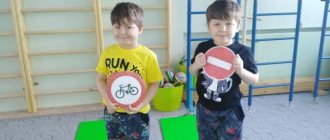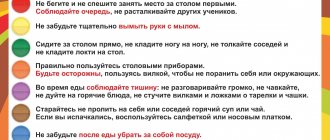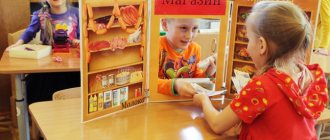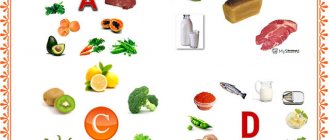Middle group
We present games on the theme “Dangerous Objects” for preschoolers of the middle age group.
Dangerous situations
For the lesson you need a sectorally divided circle, like the wheel in “Field of Miracles”. There should be 12 sectors, each with a corresponding number. The numbers should alternate in random order. On each sector you need to put a card depicting an emergency situation that a child may encounter at home, in kindergarten, in nature, or while walking.
Pupils take turns pulling out a card with a number from the bag. Find the corresponding sector. They look at the dropped plot picture, tell what is depicted, why this happened, and how to correct the situation.
Didactic game “Dangerous and safe objects”
The game is organized in the form of dominoes, and a group of 2 to 18 children participates. Players distribute cards. Using a counting rhyme or some other method, the player who starts the game is determined. He places any of the available cards. It shows an object on the right, and a picture on the left, symbolizing how a child should use this thing. There are three options:
- can be used under adult supervision;
- cannot be used - it is a dangerous thing;
- You can use it yourself - it’s a safe thing.
The player chooses how the depicted object can be used, gives reasons for the choice, and draws a conclusion whether the thing is dangerous or not dangerous. The player who was quicker than his comrades to determine which picture is needed puts down the card. The game continues until all the cards are placed correctly.
Why is a thing dangerous?
The game expands the understanding of how to behave correctly in everyday life, develops concentration, and fosters a spirit of mutual assistance. For the lesson, you need cards depicting various injuries: a cut, a hematoma, a fracture, a burn, a puncture. Images of household items are also needed.
Children sort out cards depicting injuries. The teacher takes turns showing pictures of things. Players must figure out what kind of injury can be caused by using the item shown. The player who has the corresponding image raises his hand, tells how dangerous the thing being demonstrated is, how to handle it correctly, then takes the card.
Junior group
We offer games on the theme “Dangerous Objects” for younger preschoolers.
Dangerous household items
The game is a lotto. For it you need to prepare a table with cells depicting dangerous things, as well as corresponding cards.
The teacher reads a poem or riddle about the subject. The students, having guessed what this thing is, choose a card and cover the picture in the table cell with it.
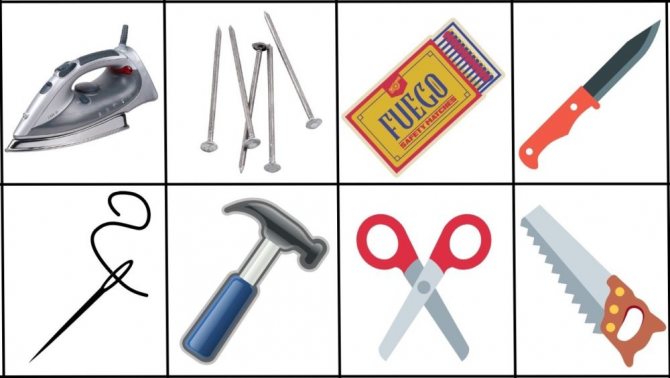
Green or red
For this lesson you need to prepare two large circles: green and red. It is also necessary to cut out small circles depicting dangerous and safe things.
The teacher lays out the pictures in front of the players. They carefully examine the images, discuss the purpose and degree of danger of the drawn objects. Then they arrange the pictures around large circles, like petals around the core of a flower. Objects that are dangerous are placed in the red circle, and items that are completely safe to use are placed in the green circle.
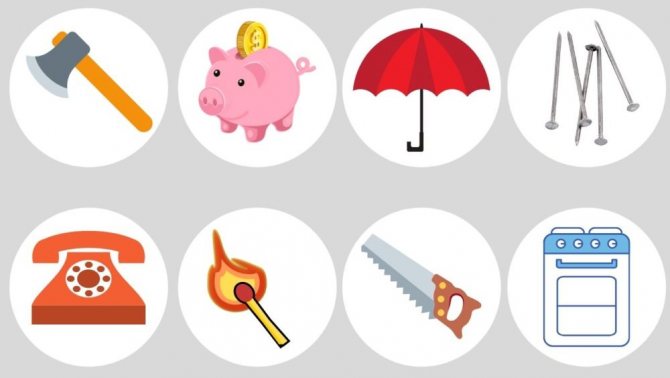
Dangers
The game reinforces the idea of what dangers a preschooler can face in everyday life, how to deal with them, and how to act correctly. The activity also teaches empathy and fosters a desire to help people in trouble. It is necessary to prepare plot pictures depicting various dangerous situations that can happen to a preschooler at home, in the yard, or in nature.
The teacher places the pictures face down. Pupils take turns taking a card at random, look at the depicted plot, tell what they see, why such a situation happened to the child, what he did wrong, how to correct the mistake, how to act.
The purpose of the didactic game “Dangerous Objects”
The goal is to form and consolidate knowledge about what objects are potentially dangerous to humans and how to handle them.
Tasks:
- identification of dangerous household items, identifying them in the environment;
- acquiring the skill of using them safely;
- developing an understanding of dangerous situations, ways to prevent them, rules of conduct in case of an emergency;
- consolidation of the concepts of “danger”, “safety”, “caution”;
- development of intelligence, visual perception, reaction speed, ability to think logically, and argue one’s opinion;
- fostering responsibility and independence.
